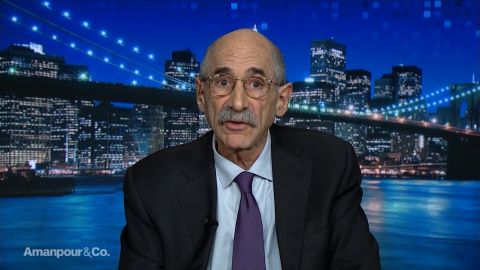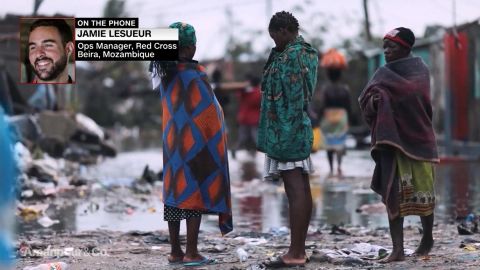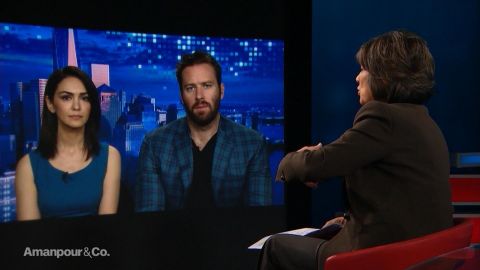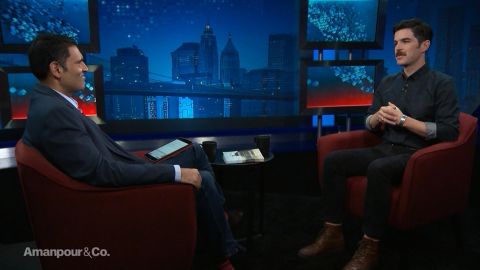Read Transcript EXPAND
CHRISTIANE AMANPOUR: So on the topic of human rights, we turn next to the U.S.-Mexico border crisis. Francisco Cantu is a third generation Mexican-American and a former border patrol agent. And unlikely pairing perhaps driven by his thirst to understand the issue from both sides of the fence, so to speak. His new book, “The Line Becomes a River, dispatches from the Border,” chronicles the brutality along the landscape he loves. And he shared the stories of the people that he met along the way with our Hari Sreenivasan.
HARI SREENIVASAN: Now, you didn’t become a border patrol agent to write this book. You had an international policy degree. You said you wanted to see how the world works. You wanted to see where this policy actually — the rubber meets the road. So what happened?
FRANCISCO CANTU, AUTHOR, “THE LINE BECOMES A RIVER”: I think there was a lot of naivete behind the decision. I sort of imagined that I could join the border patrol and do this work for a few years and then sort of leave with all these answers to this big complex problem because I had seen it from a perspective that probably not a lot of policymakers have seen it from. But, of course, the — I think I also massively underestimated the power of the institution to sort of bend the people’s purposes towards its will. And so going through the border patrol academy, it’s much like any military and law enforcement training where it’s sort of designed to break down your idea of who you are as an individual and rebuild you in the image of a law enforcement agent.
SREENIVASAN: One of the things that you mentioned is living near the border means becoming conditioned to a degree of militarization and surveillance that would cause great alarm in any other part of the country. Explain that.
CANTU: You can’t drive longer than like 30 to 40 minutes in any direction along the border without going through a border patrol checkpoint and being stopped in your car. And, of course, racial profiling is something that you are taught not to do at the academy from this like by the books standpoint but it’s really ingrained in people. And I think that the border patrol training does little to actually prevent it happening in action at the moment. It’s a very militarized space. And I think that that militarization, it’s not just border patrol checkpoints, it’s also fencing. The newest thing down in Nogales which is the closest border town to where I live in Tucson is, since the midterm election, there has been all these coils of concertina wire, razor wire that you would see around the prison. And so when you get out of your car to go walk across the border, I mean you really feel that you are in a dangerous place. And, you know, the border is actually not any more dangerous than America’s largest cities, right. El Paso is sort of famously one of America’s safest cities.
SREENIVASAN: What were your notions of what’ good, what’s bad? Were those challenged? Did that change? Did you start to accept something that you might have thought was unacceptable?
CANTU: You have people that get lost out in the desert [14:40:00] and they get left behind by their groups. And then they just try to walk out to a road or to a village to get picked up to say like just take us home. We’re lost, we’ve been out here without food or water for days. And so I encountered a husband and a wife who were in that situation. And I showed up as like the junior agent who was assigned basically just to like shuttle people back and forth from the station. As I was having a conversation with these people because I can speak Spanish, I was talking with the husband. And he said, “You know, my wife, she speaks fluent English. She grew up in Iowa.” And all of a sudden, I was having this conversation in English with this woman. And she said, “Yes, I was a Kindergarten teacher. I went home because a family member died.” And she was pregnant and she said that she was crossing the border because she wanted to have her child here because she wanted her child to grow up like she had grown up in the United States with access to all the freedoms and privileges that she had had. And I made a really big effort to remember their names. I asked them their names. I introduced myself because there was the feeling that you had an exchange that was outside of the normal exchange that you might have in those roles of enforcer.
SREENIVASAN: But ultimately you had to take them.
CANTU: Right. Of course. And her husband asked me if I could do them a favor and just bring them down to the border and let them go without putting them through the court system and bringing them back to the station. Like as a brother, right, as a Spanish-speaking person who knows our culture and is from the same background, can you take us? And, of course, I said no, I can’t do that, I have to take you in. And I remember just a few hours after that encounter, like after dropping them off, sitting in my car and trying to remember their names, and I had already forgotten it, you know, in that short amount of time. These small forms of dehumanization, right. Like forgetting someone’s name is the first act in dehumanizing them. And I think on a much larger scale, when you look at the media coverage around immigration, immigrants are always represented as this indistinguishable mass of people, right, that’s threatening the nation or that’s surging and overflowing at our borders.
SREENIVASAN: You point out that in your view that the desert has been weaponized against migrants. You’re saying that the number of bodies that we find, the number of deaths is almost because the system is designed that way. Explain that.
CANTU: Yes. So there’s a policy that was implemented under the Clinton administration called Prevention through Deterrence. And so in the sort of late ’80s and early ’90s, the border patrol began to pilot this enforcement technique where at that time you had a lot of — most migrant traffic was crossing through cities and towns along the border. And so the border patrol response was to sort of throw a lot of manpower right along the border, stationing an agent every half a mile from one another. And it completely shut down traffic and pushed it to the outskirts of town, outside of the public eye, away from cameras, away from concerned voters. And the thinking was, as that policy was adapted into a national policy, that the deserts are so remote and so hostile. There’s no water. There’s rugged mountains. The people aren’t going to risk their lives–
SREENIVASAN: It would be a natural disincentive?
CANTU: Exactly, and a deterrent. And, of course, what we saw as soon as just a few years after this policy was implemented was a huge uptick in the number of deaths that were occurring in the desert in places like Pima County where I live now. And I think if that wasn’t an unintended consequence at the time, it has now been continued by design because there has been a complete failure of political will to do anything to change that situation. We have known that people are dying in the desert now for decades.
SREENIVASAN: Would a wall work to fix that? Because that seems to be part of the argument. Hey, guess what, if we can slow the volume of people and we will slow inevitably the volume of people dying in the middle of the desert.
CANTU: Well, I mean, actually, a wall has — walls along these border towns have actually exacerbated this problem, right. That’s part of what has caused people to cross through more and more distant, remote, obscure areas. And so if you did build a wall from [14:45:00] sea to shining sea, I think you would only see a continuation of this, right? You would see people crossing on ships and boats. And I mean look at what is happening in the Mediterranean. Militarization doesn’t just come to an end once you complete a border wall. Like that mentality continues. It’s been in place for decades and really for centuries if you look at the history of westward expansion and militarization and the borderlands. SREENIVASAN: I mean you also spend several dozen pages chronicling despicable human beings, drug traffickers, and how they exploit people. Aren’t those people that we should be figuring out a way to keep out? CANTU: Sure. But I think that our policies have really emboldened a lot of those people. As it became more difficult to cross the border, it became more profitable to traffic people across the border. So these sort of powerful drug cartels that already had these strategies for smuggling drugs across the border unseen realized that there was now a lot of money to be made in doing the same thing with people. And even with, like, child separation which is another example of a deterrence-based policy, right, we’re going to make it hell for these people to cross through the border. We’re going to separate them from their children. That’s going to send a message of deterrence. In a lot of ways, that’s sort of exacerbated this problem because after that was met with outrage and then sort of called off by the Trump administration, a lot of these smuggling groups in Mexico and Central America, they were like, did you see what just happened? They’re going to separate you from your children. So like we better go now because who knows what this guy is going to do next. They use that as an opportunity to bring people across, to make them pay more money. And I think it begs the question of what is an unintended consequence and when is it a consequence that we’re OK with.
SREENIVASAN: The book takes a turn when you tell us the story of someone that you were working next to for an extended period of time. You find out that he’s undocumented. He takes a trip back home and he’s kind of stuck. You said that this is one of the first times that you realized what happens to a person after you arrest them, that that wasn’t really part of your training or part of what you guys prepared for as border patrol agents.
CANTU: This person, Jose, who is somebody I met several years after leaving the border patrol and somebody that I worked with and became friends with over the course of several years, all of a sudden in seeing what happened to him after — he left the country to go again be with a dying parent and he was somebody who had lived in the United States for 30 years, had three U.S. citizen children. And when he was attempting to come back into the country, he was apprehended and put through deportation proceedings. And so suddenly I was, as somebody who was somewhat familiar with the system, I was attempting to sort of make sense of it for his family and say, oh, he’s going to be here at this courthouse. He’s being detained here. And so I was sort of like taking his kids and his wife to see him in these different contexts and these different places within the deportation and industrial complex. And for me, that was really the first time that I was looking behind the curtain at what would happen to everybody after they are encountered in the desert and sent to court or to these privately-run detention centers.
SREENIVASAN: This is Jose speaking or you’re writing through his voice. “I’d rather be in prison in the U.S. and see my boys once a week through the glass than to stay here and be separated from my family. At least, I’d be closer to them. So you see, there is nothing that can keep me from crossing. My boys are not dogs to be abandoned in the streets. I will walk through the desert for 5 days, 8 days, 10 days, whatever it takes to be with them. I’ll eat grass. I’ll eat bushes. I’ll eat cactus. I’ll drink filthy cattle water. I’ll drink nothing at all. I’ll run and hide from La Migra. I’ll pay the mafias whatever I have to. They can take my money. They can do — they can rob my family. They can lock me away but I will keep coming back. I will keep crossing again and again until I make it, until I am together again with my family.” Now, some of the audience is going to be inspired by the words of a resolute father and someone else is going to say this is exactly the evidence necessary for why the U.S. needs more border security.
CANTU: But I think what the evidence actually shows us, what his words reveal, is that no matter what version of hell we implement through policy at the border, people are going to endure it to get to the other side, especially when their wives, their children, fathers, mothers are on the other side. Or when there is the security of safety from the certain threat of death [14:50:00] in the community that you’re fleeing. And so I think that he also shows us that the people with the best family values, the — something he told me is that “I respect the law. I respect the laws of the United States. The laws of the United States are what makes it a safe environment that I want to live in, that I want to raise my family in. And so I have the utmost laws of the United — I have the utmost respect for those laws. But if those laws are keeping me separate from my children then I have to break the law. I have to.”
SREENIVASAN: There’s going to be people with more hardline positions on immigration. They’re going to say, OK, this disillusionment that this man has gone through, he’s the outlier. If it was so bad, why aren’t we hearing this from so many other border agents? Why isn’t the system rebelling against itself?
CANTU: I mean I just don’t think that that’s the way institutions work, right? Like institutions rarely change from within. I think that everything is being done from the moment that you sign up at your border patrol recruitment facility and you show up at the border patrol academy. Everything is being done to normalize the activities that you’re participating in. And to sort of desensitize you to the hard realities that you’re seeing and participating in. It’s managed to be contained and it’s managed to be politicized in all of these ways that kind of what an average border patrol agent thinks is not even a subject of debate, right? Like how many border patrol agents are even allowed to give interviews. I mean a lot of border patrol agents probably live in fear of speaking out because they have a mortgage, they have families, this is a good job that offers a lot of security. Especially if they’re coming from these small rural border towns where there is not a lot of great employment opportunities.
SREENIVASAN: You’ve gotten criticism at some of your readings from people who said, listen, you are profiting and exploiting the pain of these people. You are part of a system that brought that pain onto them. What’s your response been to them?
CANTU: Well, I think in a lot of ways they’re making a really important argument that anybody who is in journalism or who is writing non-fiction about these kinds of issues needs to grapple with. If you’re sharing the stories from a marginalized community and sort of making your living that way, I think it’s really important to grapple with who is making money off of whose story, who is being recognized as the author of a story if you’re sharing other people’s life experiences. And so I’ve been really appreciative of those criticisms and those conversations. I think they’ve made me be a lot more intentional with what I do from, what I do with the money that I earn from the royalties of this book. A percentage of the royalties goes to groups that are working to end death and disappearance in the borderlands and mass incarceration in the borderlands.
SREENIVASAN: Given your family history, how complicated was being a border patrol agent? Here you are a fluent Spanish speaker. You’ve got Mexican heritage as well. Do you feel like you’re betraying one group of people? And then here you are an American citizen and you’re tasked with upholding the law of this country? So what was that stress like?
CANTU: I mean I think it was really hard for my mother especially. And I think she sort of did a lot to try to convince me that it wasn’t the right idea or to sort of convince me that my ideas, my motivations were naive. And I think in retrospect, there was a lot that my mother had to say —
SREENIVASAN: Moms are usually right.
CANTU: They’re usually right. I stepped into the border patrol knowing that it was part of a lot of ugliness and knowing — I had the idea, though, as a young person that I could witness that without participating in it, right? That I could sort of see it and learn from it but not be implicated in it. And I think that’s like a profoundly naive idea to think that you can step into an institution and sort of see things from within without participating in them.
SREENIVASAN: Francisco Cantu, thank you so much for joining us.
CANTU: Thanks so much for having me. It’s been a pleasure.
About This Episode EXPAND
Jamie LeSueur, the Red Cross’ Emergency Operations Manager for Africa, describes what’s happening on the ground in Mozambique. Professor Michael Oppenheimer discusses climate science. Actors Armie Hammer & Nazanin Boniadi star in “Hotel Mumbai,” about the massacre by Pakistani terrorists at Mumbai’s Taj Mahal Palace Hotel in 2008. Francisco Cantú discusses his new book “The Line Becomes a River.”
LEARN MORE



